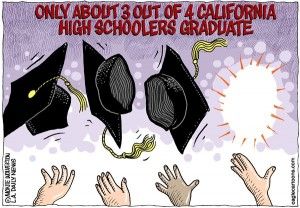Gov. Brown is pushing ‘social justice’
by CalWatchdog Staff | May 3, 2013 11:16 am
 [1]May 3, 2013
[1]May 3, 2013
By B. Wayne Hughes Jr.
The Social Justice movement that seems to be everywhere, if only in theory, has broken through the veil of being but a notion, and spread its way into the real world.
Recently in California, my home state, Gov. Jerry Brown’s bid to overhaul the state’s educational budget is the latest taste of what is to come with the social justice worldview. “This is a cause[2],” the governor of the largest state is quoted as saying.
By directing a disproportionate share of budgeted monies to serve lower-income and non-English speaking students, his “cause,” so to speak, will be shorting the districts and their children that do not reflect his idea of the favored demographic. “If they’re going to fight it, they’re going to get the battle of their lives,” he promised.
The social justice movement is based upon an alleged collective compassion for the poor, or less rich, depending on how much of social justice you’ve imbibed. Certainly compassion is a good thing, but politicians stripping one group to redistribute to another is not. This is what is being imposed upon California schools and students, leveraging one child’s educational needs against another’s.
Social justice, as it is now defined, furthers the belief that we are an unjust society in need of targeted redistribution and taxation. That we must “conform” to these fashionable expectations. That we are now a collective team, and no longer individual sovereign selves. That our generosity and compassion should be linked, fused and welded into redistribution, standardized definitions and communal expectations.
While I clearly understand the challenge of educating those that have less means, language barriers or lack of family infrastructure, I reject the notion that justice, in this case involving “resource redistribution,” must be administered unequally in our educational system. Only in the new paradigm do we see “injustice” as the cure to restoring “justice.”
Although I am not a lawyer, I do know that justice consists of fairness and equality. That justice is, or should be, blind to the defendant and plaintiff, the litigant and the suspect. “Inequality” is not necessarily unjust, socially or otherwise, and does not mandate redistribution by force of new taxes, or unequal applications, to change it. What inequality can do, however, is ring the bell to get your favored group protected under the umbrella of the “socially just,” and therefore on the right side of justice.
The social justice crowd, Brown included, would have us believe that we are a winner-take-all society; that wealth, fortune and success are zero sum games. Something is unjust because it does not have a built-in category for “what I want,” and that we should have no distinctions among groups or individuals.
Civil rights
Brown went on to say, “Equal treatment for children in unequal situations is not justice … it’s a matter of civil rights.” In other words, the only way to act justly is to treat California’s school children unequally. If a child is from a middle class family, or her first language is English, she must be discriminated against, so the governor’s logic goes.
Social justice and redistribution is what is in store for our students once the monies are divided up. Performance metrics, school choice and community service will continue to be ignored as out-of-date, objectionable and quite simply, “unjust.”
The better questions for our families and relations are, “Why isn’t the Governor fighting like this for my child? Where is his commitment to my community? Am I too middle class, too fluent in English, or too favored by ‘chance’ to garner his support?”
As Nobel economics laureate Friedrich Hayek pointed out, “Outcomes need to be arranged, and in such a way as to be pleasing to our prejudices.” I remember my 6th grade “new math” class, back in the early 1970s, where we were taught about “groups, sets, subgroups and subsets.” I barely understood those concepts at the time. Forty years later, I understand their application all too well.
B. Wayne Hughes Jr. is a California businessman and philanthropist.
- [Image]: http://www.calwatchdog.com/2013/05/01/school-reformers-aim-for-teacher-evaluations/high-school-graduation-rate-cagle-may-1-2013/
- This is a cause: http://www.latimes.com/news/local/political/la-me-pc-brown-promises-democratic-critics-battle-of-their-lives-on-education-plan-20130424,0,5842107.story
Source URL: https://calwatchdog.com/2013/05/03/gov-brown-is-pushing-social-justice/